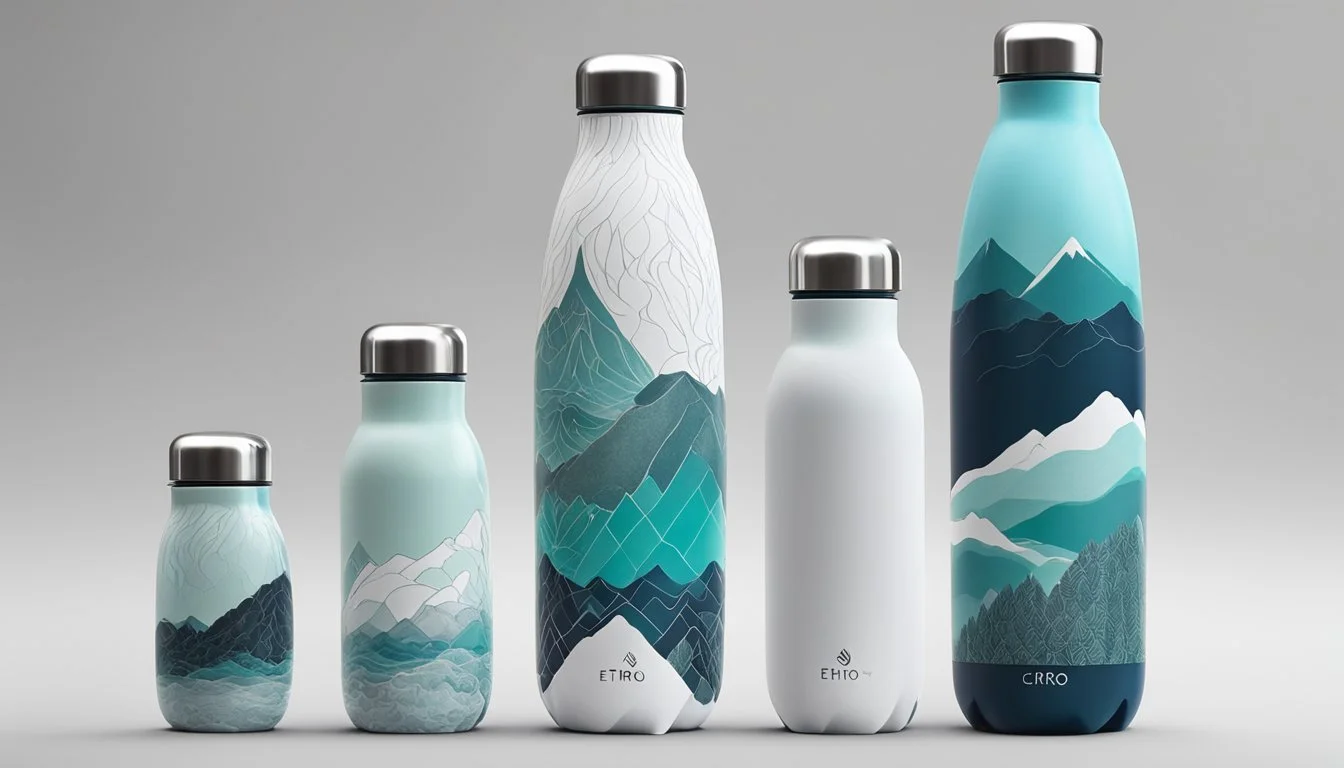Ethos vs. Cirro
Which Bottled Water Reigns Supreme?
When it comes to choosing between Ethos and Cirro bottled water, discerning consumers often find themselves at a crossroads. Both brands are committed to quality and sustainability, yet they cater to slightly different preferences and needs. Ethos offers the added value of charitable contributions to clean water initiatives, setting it apart in the market.
Cirro, on the other hand, appeals to those who prioritize purity and taste. Its dedication to providing water that is not only clean but also free from any off-putting flavors makes it a favorite among many. By emphasizing the natural essence and clarity of its source, Cirro satisfies even the most discerning palate.
For readers keen on making an informed decision, this comparison of Ethos and Cirro will highlight the strengths and unique features of each brand. Dive in to discover which bottled water aligns best with your values and taste preferences.
Understanding Bottled Water
Bottled water comes in a variety of types, each defined by its source and processing method. Several entities regulate the industry to ensure safety and quality, and the history of bottled water stretches back centuries.
History of Bottled Water
Bottled water has a long history, dating back to the Roman Empire, where thermal springs were valued. By the 19th century, commercial bottling began, focusing on mineral-rich springs. Early bottled water was marketed for its supposed health benefits.
The 20th century saw the introduction of disposable plastic bottles, making bottled water more accessible. Today, it is a multibillion-dollar global industry, fueled by concerns over tap water quality and the convenience of portable hydration.
Types of Bottled Water
Various types of bottled water cater to different preferences and needs. Spring water is sourced from natural springs and is often rich in minerals. Mineral water must contain a defined amount of minerals, sourced from protected underground sources. Sparkling water is carbonated either naturally or by adding carbon dioxide.
Purified water undergoes processing to remove impurities, and alkaline water is enhanced to have a higher pH level. Artesian water is obtained from a confined aquifer, and ordinary bottled tap water is simply municipal water that is bottled for convenience.
Bottled Water Regulations
Bottled water regulations vary by country. In the United States, the FDA oversees bottled water standards, ensuring safety and quality equivalent to tap water. Bottled water is tested for contaminants such as bacteria, chemicals, and heavy metals.
Labeling is also regulated to prevent misleading information, including the source and type of water. In Europe, regulations are stricter for mineral water, requiring it to come from a natural source and be bottled at the source without additional treatment.
Regulatory bodies aim to ensure that bottled water remains safe for consumption while maintaining the integrity of natural sources.
Ethos and Cirro Brands Overview
Ethos Water, owned by Starbucks, is recognized for its commitment to social initiatives, while Cirro offers a premium experience with a focus on quality and purity.
Ethos Brand Profile
Ethos Water aims to provide access to clean water for children in need. The brand, founded in 2002, was acquired by Starbucks in 2005. Ethos is known for its philanthropic mission, with a portion of proceeds going towards water projects in developing countries.
Ethos typically comes in plastic bottles and is sold at Starbucks locations. Prices are usually around $1.95. Features include filtered water with added minerals for taste. Key Point: Ethos combines consumer product marketing with social impact, which appeals to ethically-minded consumers.
Cirro Brand Profile
Cirro, a lesser-known brand, positions itself as a premium water option. It emphasizes purity and natural sources. Cirro sources its water from Alpine springs and uses minimal processing to maintain natural mineral content.
Cirro is bottled in eco-friendly, often glass containers, catering to environmentally-conscious buyers. Available mainly through specialty retailers, the price is higher compared to mainstream brands. Features include natural mineral water with no added substances. Key Point: Cirro's focus on quality and sustainability sets it apart in the bottled water market.
Water Source and Origin
Ethos and Cirro have distinct origins and sources for their water, impacting their taste, mineral content, and environmental impact.
Natural Spring Water Sources
Ethos Water is a subsidiary of Starbucks, known for its commitment to philanthropy. The water is sourced from natural springs. These springs provide water with unique mineral compositions, delivering a slightly sweet and clean taste.
The natural spring sources for Ethos ensure minimal processing, which may enhance its appeal to those looking for less altered water. They use sustainable practices in their sourcing, reflecting a growing trend in the bottled water industry to prioritize environmental responsibility. This approach not only helps in preserving the natural ecosystems but also promises minimal human intervention in the water they offer.
Purified and Artesian Sources
Cirro Water distinguishes itself through its use of artesian wells. The water undergoes a rigorous purification process. Artesian water is typically sourced from deeper underground aquifers, ensuring it is naturally filtered by the earth's layers.
Cirro's purification process includes multiple steps to remove impurities, resulting in water with a neutral pH and crisp taste. This method appeals to consumers who prefer water with minimal mineral content. The purity of Cirro’s water is often marketed as being free from any contaminants, highlighting its safety and clean taste. This comprehensive approach to purification maintains the natural qualities of the water while removing any undesirable elements.
Taste and Composition
Ethos and Cirro bottled waters each present unique characteristics in taste and composition. Key differences stem from the minerals and electrolytes they contain, their specific flavors, and their pH levels.
The Role of Minerals and Electrolytes
Ethos water prioritizes a balanced mineral content, which includes calcium and magnesium.
Calcium in Ethos helps maintain bone health and contributes to a slightly sweet taste. Magnesium can provide a small energy boost and adds a mild mineral aftertaste.
Cirro water, in contrast, focuses on electrolyte content, particularly sodium and potassium, meant to enhance hydration. These minerals do not significantly alter the taste but are critical for replenishing lost nutrients quickly.
Flavors and Water Taste
Ethos water is known for its clean and neutral taste with minimal mineral aftertaste.
The balanced mixture of minerals in Ethos results in a smooth drinking experience, appreciated by those who prefer a subtle flavor profile. On the other hand, Cirro water is slightly more robust in flavor due to its electrolyte content.
Some users note a mild bitterness in Cirro, which can be off-putting for those sensitive to changes in water taste. Despite this, the overall taste remains clean and is often favored by athletes for its rehydration benefits.
pH Levels
Ethos water typically has a neutral pH level around 7, ensuring a smooth and refreshing experience.
Neutral pH is ideal for most consumers, avoiding the potential acidity or alkalinity that can alter flavor and affect health. Cirro, however, usually features a slightly alkaline pH, ranging from 7.5 to 8.5.
Alkaline water can be beneficial for those seeking to balance their body's pH levels, though the taste can be slightly different, often described as smoother and silkier. Both brands cater to different preferences and needs in terms of pH balance.
Health and Hydration
Comparing Ethos and Cirro bottled waters involves examining their benefits for hydration and health, with an emphasis on alkaline versus still water options.
Hydration Benefits
Both Ethos and Cirro offer clean and safe drinking water, which is essential for proper hydration. Staying hydrated supports various bodily functions, such as temperature regulation and joint lubrication. Ethos water is often marketed as a premium option, emphasizing its sourcing and purity, making it appealing for those concerned about the quality of their hydration.
Cirro, meanwhile, aims to provide a balance between cost and quality, often focusing on affordability without compromising on essential health benefits. Access to clean drinking water is crucial for maintaining overall health, and both brands deliver this effectively. Whether choosing Ethos or Cirro, consumers can count on adequate hydration for daily wellness.
Alkaline vs. Still Water
Alkaline water, such as some variations offered by Ethos, has a higher pH level compared to regular still water. Proponents suggest benefits like balanced body pH and improved hydration. Alkaline water is believed to neutralize acid in the bloodstream, contributing to better health.
Cirro primarily provides still water, which remains the most common form for daily consumption. Still water is valued for its purity and reliability, without any additives or altered pH levels, making it an excellent choice for safe hydration.
Ultimately, the choice between alkaline and still water may depend on personal health preferences and specific hydration goals. Both Ethos and Cirro offer products that cater to these different needs, ensuring consumers have access to the type of water that best supports their lifestyle.
Filtration and Purity
Ethos and Cirro bottled water brands use distinct methods to achieve the best possible purity and adhere to strict quality standards. Their filtration techniques, effectiveness at removing contaminants, and adherence to regulatory standards are crucial factors.
Filtration Methods
Ethos uses advanced filtration methods including reverse osmosis (RO) and carbon filtration. This multi-stage process ensures the removal of particles, chlorine, and other impurities, enhancing the safety and taste of the water.
Cirro relies on a proprietary filtration process, often involving RO and UV disinfection. RO is particularly effective in eliminating dissolved solids, bacteria, and viruses, making Cirro water one of the cleanest options available.
Both brands aim for high purity using different yet effective filtration strategies, which cater to diverse consumer preferences and needs.
Purity and Contaminants
Ethos focuses on ensuring minimal contaminant presence by employing comprehensive filtration stages. These stages are designed to remove 99.9% of contaminants, including heavy metals like lead, chemicals, and bacteria.
Cirro water also achieves high purity levels, targeting a broad spectrum of contaminants. Their process includes rigorous testing and quality control to maintain low contaminant levels, ensuring safety and integrity.
Whether it’s removing chlorine, lead, or microbial contaminants, both brands prioritize the health and safety of their customers through meticulous purification processes.
Quality and Regulatory Standards
Ethos adheres to stringent quality standards set by regulatory bodies, including the U.S. Environmental Protection Agency (EPA) guidelines. They also follow international standards to ensure global acceptability.
Cirro conforms to similar high standards, often exceeding required benchmarks. Nestlé Waters, Cirro's parent company, commits to maintaining rigorous quality checks in all their products, aligning with both national and international regulatory requirements.
Regular audits and certifications further ensure that the water meets or surpasses all mandated regulatory standards, guaranteeing the consumer receives a product of the utmost quality.
Ethos and Cirro's dedication to using superior filtration methods, achieving high purity, and adhering to strict quality and regulatory standards sets them apart in the bottled water market.
Environmental Factors
Ethos and Cirro both position themselves as eco-conscious brands, but their approaches to sustainability and environmental impact differ significantly.
Plastic Usage and Sustainability
Ethos Water utilizes recycled PET (rPET) plastic for its bottles. This material reduces waste compared to traditional plastic bottles. Ethos also contributes to water initiatives, which indirectly supports global sustainability efforts.
Cirro aims to minimize environmental impact by offering water in glass bottles, which are 100% recyclable and tend to have a higher recycling rate. This choice eliminates the plastic waste problem. Additionally, glass bottles do not leach chemicals over time, making them a safer and more sustainable option.
Both brands prioritize sustainability. Ethos leverages recycled materials while Cirro shifts away from plastic entirely.
Environmental Impact and Carbon Footprint
Ethos Water has a moderate carbon footprint due to the production and recycling processes involved with rPET bottles.
However, Ethos actively participates in environmental and humanitarian programs, which help mitigate its overall impact.
Cirro's use of glass bottles generally results in a higher initial carbon footprint due to the energy-intensive manufacturing process. However, the long-term benefits of glass—being infinitely recyclable without quality loss—compensate for this initial impact.
By focusing on highly recyclable materials and lower transportation emissions, Cirro aims to reduce its carbon footprint over time.
Thus, both brands engage in efforts to minimize their environmental footprint, albeit through different strategies.
Market Presence and Accessibility
Ethos and Cirro bottled water brands have unique attributes that influence their market presence and accessibility. The following subsections will delve into global demand and distribution, as well as convenience and retail access.
Global Demand and Distribution
Ethos and Cirro have distinct strategies regarding global market demand and distribution. Ethos waters are well-known for their philanthropic efforts, contributing to clean water initiatives. This branding helps elevate their presence in various international markets.
Cirro, while less focused on charitable contributions, emphasizes quality and affordability, which appeals to a broad consumer base. Their market strategy focuses on penetrating high-demand regions, leveraging efficient distribution networks. This ensures that Cirro remains accessible in multiple countries.
Both brands utilize strategic partnerships with global distributors to expand their reach. Ethos positions itself in select markets that align with its brand values, whereas Cirro targets a wider range of markets by capitalizing on cost-effective distribution channels.
Convenience and Retail Access
Retail accessibility of Ethos and Cirro varies significantly based on their market strategies. Ethos waters are commonly found in high-end grocery stores, natural food chains, and leading coffee shops, such as Starbucks. This strategic placement aligns with their premium brand image and supports their initiatives for global water solutions.
Cirro focuses on convenience and affordability, making their products accessible in a variety of retail environments. Their waters are frequently available in grocery stores, convenience stores, and bulk retailers, catering to everyday consumers.
The presence of these brands in diverse retail locations greatly affects their accessibility. Consumers can find Ethos in specialized outlets, while Cirro's widespread availability makes it a convenient choice for a larger audience. These distribution methods reflect the brands' differing approaches to capturing market share and ensuring product accessibility.
Consumer Experience
Consumers' perceptions and loyalty toward Ethos and Cirro, as well as insights from water sommeliers, significantly shape the overall experience with these bottled water brands. The quality, taste, and brand reputation often play critical roles in determining preference.
Brand Perceptions and Loyalty
Brand perception is pivotal in influencing consumer preference. Ethos, owned by Starbucks, markets itself as a socially responsible brand. A portion of their sales supports global clean water projects, which can create a sense of community and purpose among consumers.
Cirro, while less philanthropic, focuses on premium quality and design. Their sleek packaging and claims of high purity appeal to a more aesthetically driven audience.
Brand loyalty also reflects in consumer choice. Individuals familiar with Fiji's soft taste or Acqua Panna's smooth texture may also pick Ethos for its social mission. Meanwhile, Cirro competes with brands like Voss or Smartwater for customers who prioritize elegance and mineral balance.
Water Sommelier Insights
Water sommeliers analyze bottled water varieties based on source, taste, and mineral content. Sommeliers note that Ethos offers a balanced taste with no overpowering minerals, appealing to those seeking a mild flavor. Its ethical appeal is an added bonus rather than a detractor.
Cirro's purity resonates with sommeliers looking for the cleanest taste, free from contaminants or additives. This positions Cirro alongside brands like Essentia and Icelandic Glacial, known for their purity and high-quality sourcing methods.
While Evian and Fiji receive praise for their natural and distinct flavors, Mountain Valley Spring Water stands out for its blend of minerality and smoothness, somewhat mirroring the experience Cirro aims to provide.
The insights from water sommeliers highlight key differentiators that influence consumer choices, making it essential for brands like Ethos and Cirro to communicate their unique selling points effectively.
More About Ethos
Ethos vs Mountain Valley Spring Water: Which Bottled Water is Better?
Ethos vs Richard's Rainwater: Which Bottled Water is Better?
Ethos vs Whole Foods Italian Still Mineral water: Which Bottled Water is Better?









